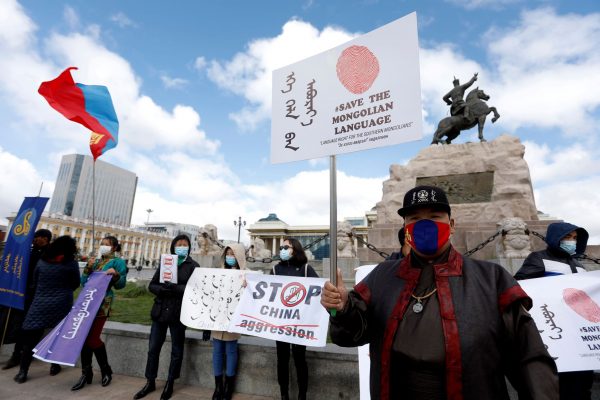It would not only be an opportunity for South Korea to make its democratic voice heard, but also to safeguard ethnic Koreans in China and bolster its diplomatic engagements in the region.
Toward the end of 2020, the Chinese government sparked rare protests in Inner Mongolia after announcing that Mandarin Chinese, not Mongolian, would be the language of instruction for key school subjects in the region. The protests were unusual because China’s Mongolian minority is among the least restive of China’s ethnic communities.
The story received little international media attention because it took place in a remote region, was less draconian than China’s treatment of its Uyghur minority and lacks the history of Tibet’s struggle to maintain its identity. Still, it is an important example of China’s ongoing efforts to dilute the identity of ethnic minorities within its borders. China’s policy is pernicious because it is self-proving: if ethnic minorities protest, it is proof that they are socially disruptive and should be suppressed.
Mongolia has taken an interest in the Mongolian language issue but must be careful to not provoke China and be accused of irredentism. It has successfully managed for decades to create space for inter-Mongolian communication without disturbing Chinese sensitivities. Mongolians have much to lose if the border hardens.
South Korea, too, has exercised care not to unnecessarily provoke China. But advocating for the rights of the ethnic Mongolian community could be one way for South Korea to also defend the interests of ethnic Koreans in China, who face similar obstacles to preserving their culture as the Mongolian community.
There are approximately two million Chinese Koreans in China, half of whom live in the north-eastern province of Jilin. Since the 1990s, the Chinese Communist Party (CCP) has increasingly advanced Mandarin-centric education in Jilin, resulting in a dramatic decrease in the number of Korean-language schools throughout the region. Consequently, many young Chinese Koreans today resolutely identify as Chinese with little reflection on the Korean side of their identity. Additional efforts to phase out Korean language, culture and history in Northeast China portends further marginalisation of the Korean diaspora in China.
With the South Korean government becoming more attuned to the role that diaspora communities play in amplifying Korean culture, Seoul has an interest in changing Beijing’s approach to its minority communities more generally, including the CCP’s treatment of ethnic Mongolians. Seoul and Ulaanbaatar have a mutual interest in nudging China to respect human rights.
Cultivating ties with Mongolia also has economic importance for South Korea. Mongolia is a key player in South Korea’s New Northern Policy, which aims to strengthen connections between Northeast Asian countries through cooperation in power generation, transportation and agriculture. Mongolia’s role in this initiative is to supply South Korea with solar and wind energy, helping both countries decrease their reliance on coal and contribute to global efforts to mitigate climate change.
Mongolia is also well-positioned to support inter-Korean diplomacy and peace. It maintains good relations with Pyongyang — as former Socialist-bloc allies, many Mongolians studied at North Korean universities, cultivating people-to-people ties.
Mongolia’s history of hosting meetings to resolve tensions, including the Six Party Talks and the Ulaanbaatar Dialogue, showcases its potential to support the Korean peace process. Mongolia also participates in regular meetings with the two Koreas, Russia, China and Japan as a member of UNESCAP-ENEA, the UN Economic and Social Commission, East Northeast Asia. Seoul’s relationship with Ulaanbaatar could play a helpful role in future peace and nuclear diplomacy with Pyongyang.
Staking an interest in China’s Mongolian minority is an opportunity for South Korea to take up a Northeast Asian issue without having to choose between the United States and China. Unlike other controversies regarding the South China Sea, Taiwan or military cooperation, South Korea has reasons to raise the Mongolian language issue that have nothing to do with the United States.
South Korea’s national interests require it to tread carefully between the United States and China, as well as in its relations with Japan and with North Korea. The issue of how to promote human rights in North Korea while trying to improve inter-Korean relations has long been difficult for Seoul and opened South Korea to criticism that it is insensitive to human rights abuses.
With the inauguration of the Biden administration in the United States, human rights and liberal values are reappearing on the international agenda. The Mongolian language issue provides South Korea an opportunity to carve out a position as a promoter of human rights and values. Seoul’s engagement on these issues will help advance other goals like protecting ethnic Koreans in China, engaging North Korea and strengthening economic ties in North and Northeast Asia.
Alexandra Langford is a research intern at the Korea Economic Institute of America (KEI).
Mark Tokola is Vice President of KEI.
All views expressed in this article are entirely the authors’ own and do not necessarily reflect the views of any particular institution or organisation.


This article includes lots of mis-information and disinformation.
As ethnic people, they are free to conduct their own languages at their own pace. But they also must be equipped with the main language so as to Integrate well with other people, to work with people for earning money to improve their well-being.